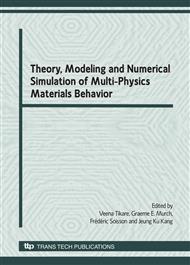p.101
p.107
p.113
p.119
p.123
p.129
p.135
p.141
p.151
Reaction Rate as an Effective Tool for Analysis of Chemical Diffusion in Solids
Abstract:
In their paper, R. Merkle et al [R. Merkle, J. Maier, K.D. Becker and M. Kreye, Phys. Chem. Chem. Phys. 6, 3633 (2004)] conducted an experimental study on the chemical diffusion of oxygen in Fe-doped SrTiO3 single crystals driven by large changes in the oxygen ambient partial pressure. The stoichiometry dependence of the chemical diffusion coefficient was derived on the basis of the concept of conservative ensembles for two independent trapping reactions, which then served for calculating the evolution of vacancy profiles. The theoretical predictions were compared to the experimental results. In the framework of the same model, in the present communication, the chemical diffusion of oxygen was analyzed by the concept of a dynamic reaction front [M. Sinder, J. Pelleg, Phys. Rev. E 61, 4935 (2000); Z. Koza, Phys. Rev. E 66, 011103 (2002)]. We show, that by using a quasi-chemical reaction rate profile, it is possible to obtain information relating to the position and width of the zone where the reaction takes place. It is indicated, that the reaction rate distribution can be directly calculated from measured concentration profiles of the immobile reactant.
Info:
Periodical:
Pages:
123-128
DOI:
Citation:
Online since:
April 2008
Authors:
Keywords:
Price:
Сopyright:
© 2008 Trans Tech Publications Ltd. All Rights Reserved
Share:
Citation:


